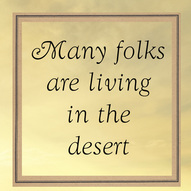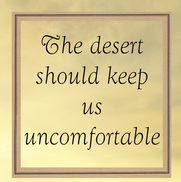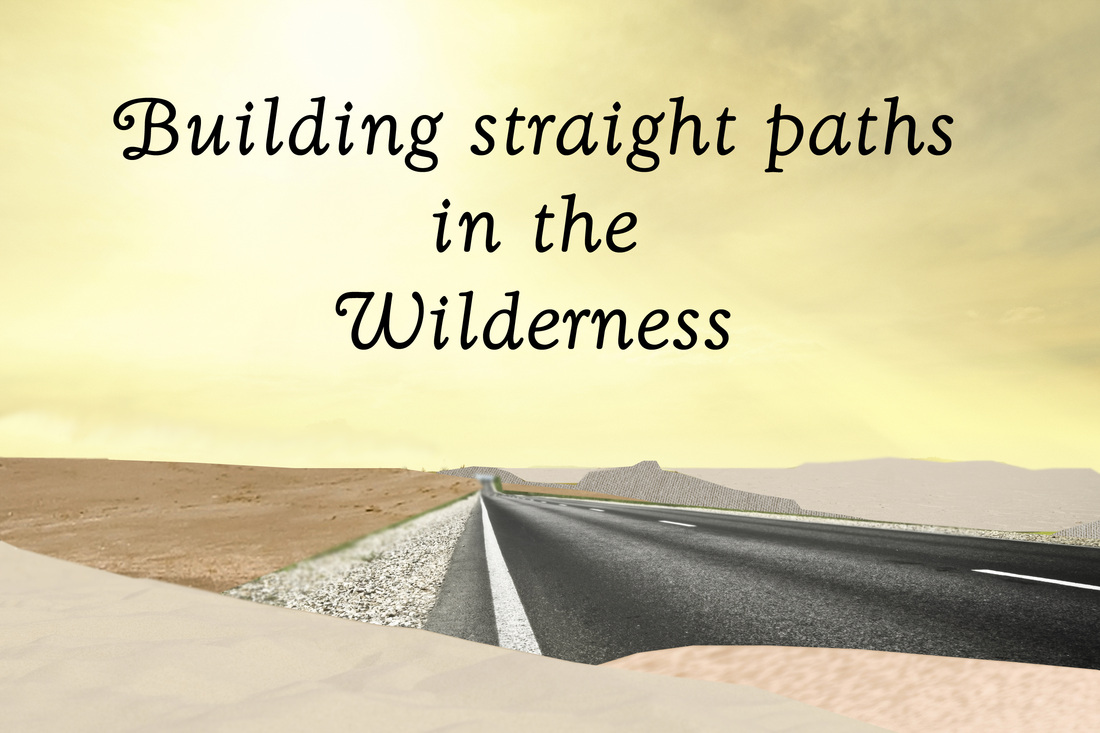|
-Matt Have you ever tried to build something without the proper tools? Perhaps you wanted to hang a picture on the wall, but you had no nails. I used to go camping when I was a teenager, and it was a pretty normal occurrence for something to get forgotten by someone. So we had no “proper” tool to do what we needed to do. We had to find some way of doing what needed to be done without the right tools. So, stones were used as hammers, a screwdriver was used as a fork and, one time, we even had to try and fix someone's engine with a pocketknife. It worked well enough to get the car to the next gas station too. These memories are what pop into my mind when I read texts like Isaiah 40.3-8: “A voice cries out: 'In the wilderness prepare the way of the Lord, make straight in the desert a highway for our God. Every valley shall be lifted up, and every mountain and hill be made low; the uneven ground shall become level, and the rough places a plain. Then the glory of the Lord shall be revealed, and all people shall see it together, for the mouth of the Lord has spoken.' A voice says, 'Cry out!' And I said, 'What shall I cry? All people are grass, their constancy is like the flower of the field. The grass withers, the flower fades, when the breath of the Lord blows upon it; surely the people are grass. The grass withers, the flower fades; but the word of our God shall stand forever.'” We often hear the phrase „”prepare the way of the Lord,” but it seems to me like we forget the full context of that verse: “IN THE WILDERNESS prepare the way of the Lord, make straight IN THE DESERT a highway for our God.” The wilderness and the desert are integral parts of what this voice is crying out. And this is why it reminds me of camping when I was younger. But have any of you ever tried to build a highway in the desert? I can't imagine it must be a lot of fun. I mean, it's a DESERT. Is it a sandy desert? Where do you lay the firm foundation for the road? What do you do when the wind covers the road with sand? Is it a rocky desert? Well, you have a foundation now, but what do you do about the rocks? Do you go around them? Build over them? Or, perhaps you blast through them? And temperatures in the summer can rise well above 100 degrees. In Utah the temperatures actually, on occasion, caused the pavement itself to buckle with the heat. Then there's little or no shade and don't forget all the hot machinery you're working with. And, if all that is starting to warm you up on a winter's day, then here's another bit of trivia for you: Many people don't know that Antarctica is considered a desert as well. Imagine trying to build a highway there. But the voice crying out in Isaiah doesn't stop with just preparing a road. Valleys get lifted up, mountains are made low, uneven ground is made level and rough places are made plain. This is a total re-ordering of landscape. I grew up not far from the world's largest open-pit mine, Kennecott Copper Mine. This mine is so large that it is visible from outer space. The mine was first opened in 1906. In 108 years, they have managed to dig a hole a little less than one kilometer deep and four kilometers wide. This mine has radically re-ordered the landscape around it. To the point where the mining company has had to spend over $400 million to clean up the affected areas. But basically, with all of this work during a little over one hundred years, miners have been able to remove ONE rather small mountain. All of a sudden, repairing a car engine with a pocketknife seems easy.  Perhaps it is no wonder then that Isaiah's next words respond to how overwhelming this vision is: "What shall I cry? All people are grass... surely the people are grass. The grass withers, the flower fades...“ When we stand before the task that God calls us to in Isaiah, making a road in the desert and levelling the land, we can find ourselves feeling completely inadequate. Like grass. If we are “in the desert,” then how can we possibly even begin to prepare anything for the coming of God? Perhaps some of us are in the deserts of pain, loss, hopelessness or even depression. I think now of Elijah wandering off into the desert with nothing to eat or drink, wanting to just die. What shall we do when we feel as Elijah felt, as dying grass in Isaiah's desert? How can we prepare ANYTHING for the Lord? The Lutheran pastor Wolfgang Bittner illustrates how deeply this verse connects with his words that: “Theology without a deeply affected life simply does not exist in a biblical perspective.” That is, our faith goes beyond merely thinking the right things. Our faith deeply affects our entire lives.  Many folks are living in deserts. Either stranded out there by people they thought of as friends, or chased out, or just wandered out in despair like Elijah, or perhaps even those (like Jesus) who have been led by the Spirit into the desert for a time. How can we act as the Voice of the Lord in Isaiah asks us to? How can we prepare a way? I think we first have to think about or remember what life in a wilderness is like, especially thousands of years ago. You didn't just wake up to a pretty landscape, then turn up the air-conditioning and turn on the kitchen tap for a glass of water. The wilderness was a place where such luxuries did not and could not exist. A place of hardship and trial. We can see this from the forty years the Hebrews wandered in the desert, as well as from Jesus' temptation when he was in the desert. We can also see this from studying desert biology where plants and animals have evolved without plenty of resources. Spines and spikes are normal for many plants. There's a basic survival need to maximize the potential of every ounce of energy and water. To slightly change the title of a famous Heinlein book: The Desert is a Harsh Mistress. But that's exactly the POINT. Most folks like to be comfortable. We surround ourselves with veritable luxury—heating, air-conditioning, electricity, wlan, smartphones, etc. But the wilderness is a place that is decidedly un-luxurious. Think along the lines of a real life post-apocalyptic scenario. Mad Max, Waterworld, Salt Lake City, that kind of stuff. But in the Bible, the wilderness is a place where Israel had to come to rely totally and completely upon God. In other words, the desert was a place to deeply experience God's grace and salvation. Because that was ALL that could be relied upon. In that sense, the desert can be our friend. It will never really get comfortable. But it can be a place that reminds us of our need for fellowship with each other, and fellowship with God. It can be a place that reminds us of our need for God to come to US. And it can, hopefully, cause us to re-think how we interact with each other. Because, while competition may work on certain biological scales, the best way to survive a desert is through cooperation. Cooperation is something that can be the difference between life and death when it comes to camping or hiking trips into the wilderness. Almost every year there is a story of some hiker who has gone missing and no one knows where s/he has gone because the hiker never bothered to tell anyone where they were going or for how long. The chances of finding such a person are, sadly, slim. But tell someone what you're doing, where you're going, and you have far better chances of survival in case something happens. Cooperate with another person just a little bit, and increase your chances manifold.  The desert is uncomfortable and it should keep us uncomfortable. Because, as one of my favorite Frank Herbert quotes goes: “Religion must remain an outlet for people who say to themselves, 'I am not the kind of person I want to be.' It must never sink into an assemblage of the self-satisfied.” Of course, no one likes being uncomfortable. Myself included. So I think it's a constant process of consciously allowing yourself to be open to be made uncomfortable. Of trying to appreciate the times you are in the desert, for whatever reason. (Note: Saying that we should allow God to make us uncomfortable is not the same as saying that all uncomfortableness is from God.) So, I guess it's rather paradoxical that I love the desert so much. It doesn't make much sense. But, in the words of the extreme marathon runner Mauro Prosperi who was lost in the Sahara for ten days: “I can't live without the desert. Desert fever does exist, and it's a disease that I've absolutely caught. I'm drawn back to the desert every year to greet it, to experience it.” Matt grew up in Utah, but now calls Europe home. Matt has a master's in theology. Matt is Pansexual and Genderfluid. Matt is fascinated by Augustine, likes Britney Spears, Mastodon, and finds theology everywhere.
|
Categories
All
Archives
October 2023
|




 RSS Feed
RSS Feed